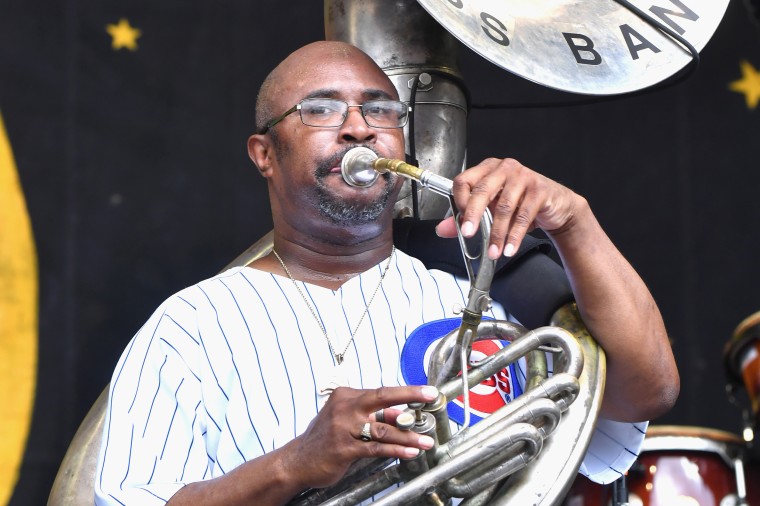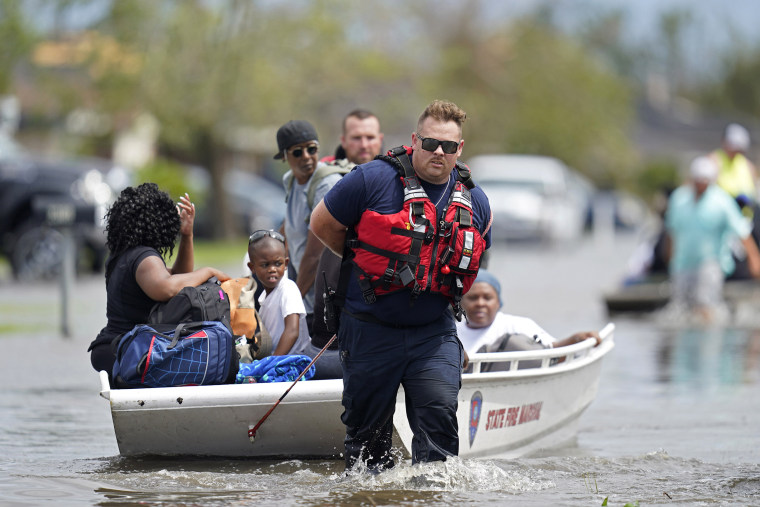The members of the Rebirth Brass Band, a New Orleans institution, don’t know how they’re going to get home. Stuck in Philadelphia, the musicians feel helpless as they watch images of Hurricane Ida’s destructive path through New Orleans play across their television screens.
Keith Frazier, who founded the legendary group in the 1980s with his brother, said they hope to get home soon or find shows to play until they are able to. The band left for Virginia on a tour up the East Coast last week and had planned to return this weekend.
“We can’t get back to help our family members, and at this point we don’t even know how to get back home,” Frazier said over the phone. “No one has electricity. People aren’t able to charge their phones, so we can’t call anyone. It feels really dire.”

Frazier and other New Orleanians spoke about their immense anxiety after the storm, as well as the deep and special affection they feel for their Louisiana home. The feelings are complicated, and they are particularly heightened because of the 16th anniversary of Hurricane Katrina.
Ida, they said, only further highlights the odd mix of pain, worry and gratitude they feel during this troubling anniversary.
“The stress level is very high,” Frazier said. “And we’ve been talking about what can we do? What are we going to do to bring comfort to those people who don’t have just basic needs right now?”
Ida, which weakened to a tropical storm Monday, wrecked and flooded homes, uprooted trees and brought down power lines. More than 1 million homes and businesses are without power, and 911 lines in Orleans Parish and across southeastern Louisiana are down, as well. The number of deaths is expected to spike, officials said.
Katrina left New Orleans inaccessible for months. Authorities continued to urge residents to shelter in place Monday, requested that people stay out of the city and said it could take weeks to restore electricity to New Orleans.
Joshua Cousin, who lived through Katrina before he evacuated to Texas for months, remained at home in New Orleans on Monday. Cell service was spotty, he said, and the lack of air conditioning was becoming particularly onerous, with thick humidity and temperatures reaching nearly 90 degrees.
Cousin recalled how Katrina brought dangerous floodwaters and forced him and his family to wait for evacuation on the side of an interstate. He said he felt immense relief that the city’s protections appeared to work this time, and it didn’t seem that he and his family would have to climb onto a bus heading for Texas.
“Now you see the benefits of rebuilding the levees, cleaning out the drainage, rebuilding all these projects — it worked,” he said. “Things might not be functioning for a while, but we’re not complaining.”
That was a common refrain Monday.
Howie Kaplan, owner of the music venue The Howlin’ Wolf, said he’d been brought to tears earlier in the morning when he and his neighbors wordlessly got to work clearing broken glass from the street, later sharing cold bottles of water.
The moment crystallized his feelings for the city he intends to call home for the rest of his life, Kaplan said.
“When you wake up in New Orleans, you know where you are. You can feel it in your bones. You can feel it in your heart. You feel it in your soul. You hear it,” he said. “It’s how people interact with you, how people talk to you, how people treat you. We’re all in this together.”
Even more recent residents spoke of a special relationship with the city.
Olivia Morgan, who moved to New Orleans three years ago, said the place had quickly become her home. After she evacuated to Alabama, she is helping coordinate food drive efforts with Culture Aid Nola as best she can — work she has done through the pandemic.

“New Orleans is everything to me,” she said. “It’s been my dream my whole life to live there, and it’s just scary not being there right now, not knowing what’s going on and not being able to help. I love the city so much, and it’s just nerve-wracking.”
Still, while Ida highlighted the love many have for the city, it also underscored some growing challenges.
Cousin said the city changed much after Katrina. The St. Bernard housing project he lived in with his family was demolished after the 2005 hurricane and rebuilt as a mixed-income neighborhood that doesn’t share in the cultural history he grew up with. He said other elements of the city’s cultural riches have become further profit-oriented.
“New Orleans is a different beast now,” he said. “I love the same stuff, the elements still exist today, but a lot of things that were homegrown and natural to us are now commercialized — it’s television.”
While some shared the same grievance, they said their love for New Orleans and the special kinship they feel with others who live there continues.
It’s a place you really have to live in to call home, Frazier said.
“It’s hard to live in New Orleans. We know we’re surrounded by water. It’s a constant battle to try to survive,” he said. “People are always watching, because at any point thunderstorms, floods or hurricanes can wipe the city’s streets out. It takes a lot to live there, but that means you have to want to be from New Orleans to be there — it means we don’t take anything for granted.”
Related video:
This story first appeared on NBCNews.com.